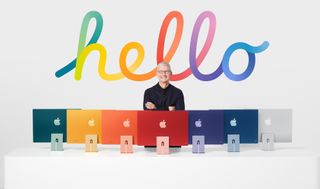The Mac is back — and the M1 chip gets the credit
Apple posted record Mac sales in the last quarter, as people clamor for Apple Silicon

With the iPhone continuing to drive the bulk of Apple's sales, and new products like Apple Glasses and the long-rumored Apple Car looming in the future, it's easy to overlook the Mac: the product that started it all. But lately, Mac sales have Apple partying like it's 1984.
Apple reported its quarterly performance for the three months ending on March 27 today (April 28). The Mac's performance in particular stood out among positive numbers all around for the company. Revenue from the Mac business hit $9.1 billion for the quarter, a 70% jump from the same quarter a year ago. That's an all-time record for Apple's Mac segment.
- Best laptops: Where the M1 Macs rank
- Which laptop to get? MacBook Air vs. MacBook Pro
- Plus: MacBook Pro 2021 16-inch — 5 upgrades we need to see
As strong as Apple's Mac sales were for the first three months of the year, they're still a drop in the bucket compared to other segments of Apple's business. Both Apple services and iPhones bring in much more revenue, with the latter accounting for 54% of the company's total sales this past quarter.
Still, the last three quarters of Mac sales have been the best three quarters in the entire history of the product line. That's not bad for a segment of Apple's business that was increasingly feeling like an afterthought in an era of smartphones, wearables and subscription-based services.
The Mac had its best quarter of all time, beating the record set two quarters ago. Revenue was up 70% to $9.1B. pic.twitter.com/b3AwMY4DJUApril 28, 2021
The Mac's recent performance is particularly impressive, given the recent history of Apple's computing segment. For its 2018 and 2019 fiscal years, Apple reported declining Mac sales in four out of the eight quarters, with flat sales in an additional quarter. Mac sales also declined in the first half of the 2020 fiscal year, so it's been quite a turnaround for Apple.
Mac sales: Fueled by the M1 chip and pandemic needs
It's not hard to pinpoint the reasons for the Mac's recent success, and they start with the M1 chip, which is now powering several new models. Apple Silicon was first unveiled during last year's Worldwide Developer Conference. Laptops sporting the Apple-built chips first showed up in late 2020. The current growth in Mac sales is being driven by "a very enthusiastic response to new Macs powered by M1 chip," chief financial officer Luca Maestri told Wall Street analysts during a call today, discussing Apple's performance.
Last year, Apple released three new machines powered by Apple Silicon: the 13-inch MacBook Pro with M1, the MacBook Air with M1 and the Mac mini M1. Those three models are the ones leading the way on Apple's booming Mac sales. A fourth machine, the iMac 2021, debuted last week Pre-orders for the iMac 2021 will start this Friday (April 30), so the device won't affect Apple's revenue until later in this current quarter.
Sign up to get the BEST of Tom’s Guide direct to your inbox.
Upgrade your life with a daily dose of the biggest tech news, lifestyle hacks and our curated analysis. Be the first to know about cutting-edge gadgets and the hottest deals.

It's not just Apple Silicon that's pushing more people to get new Macs. Apple executives conceded that the company has benefitted from two effects of the coronavirus pandemic: the push to work at home, and the initiative to teach kids via remote learning.
"Both the Mac and iPad are incredibly relevant products for our customers in the current working and learning environments," Maestri said. (The iPad saw its sales surge 79% to $7.8 billion during the March quarter.)
Mac sales: The outlook
Apple's Mac and iPad businesses may now be in a tricky spot, as we being to emerge from the coronavirus lockdowns. The demand for computers and tablets has started to ease up somewhat. Apple, however, seems to be taking steps to address that.
Consider the new products Apple introduced a week ago. Besides that iMac 2021, there's also the new iPad Pro, which is also powered by an M1 chip. Apple hasn't discuss products beyond that yet. But the company has committed to moving its entire Mac lineup to Apple Silicon, with recent reports suggesting that the M2 chip has gone into production.
Beyond new products, Apple executives also believe we're not going back to the way things were pre-pandemic on every front.
"Where this pandemic will end, it seems like many companies will be operating in a hybrid kind of mode," CEO Tim Cook told analysts. "And so it would seem that work from home and the productivity of working from home will remain very critical."
Whatever demand is out there for laptops and desktops, Apple seems to be well-positioned to meet it. And the switch to Apple Silicon may be a big reason why.
Philip Michaels is a Managing Editor at Tom's Guide. He's been covering personal technology since 1999 and was in the building when Steve Jobs showed off the iPhone for the first time. He's been evaluating smartphones since that first iPhone debuted in 2007, and he's been following phone carriers and smartphone plans since 2015. He has strong opinions about Apple, the Oakland Athletics, old movies and proper butchery techniques. Follow him at @PhilipMichaels.

